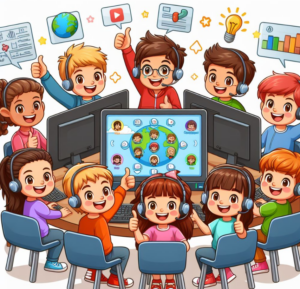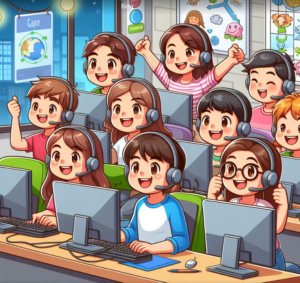 Engaging in video games offers numerous cognitive advantages, notably refining mental sharpness and problem-solving acumen. Immersed in these virtual worlds, players confront swift decisions, strategize on-the-go, and adeptly adapt to ever-evolving scenarios. Such gameplay enhances decision-making prowess. Genres like puzzle-solving and strategy games, in particular, demand intricate problem-solving strategies, nurturing critical thinking and effective solution-forming skills.
Engaging in video games offers numerous cognitive advantages, notably refining mental sharpness and problem-solving acumen. Immersed in these virtual worlds, players confront swift decisions, strategize on-the-go, and adeptly adapt to ever-evolving scenarios. Such gameplay enhances decision-making prowess. Genres like puzzle-solving and strategy games, in particular, demand intricate problem-solving strategies, nurturing critical thinking and effective solution-forming skills.
Furthermore, gaming’s positive influence extends to spatial awareness, memory retention, and sustained attention. These games typically require adept spatial navigation, consistent memory retrieval, and focused concentration to advance, serving as practical workouts that bolster these cognitive faculties.
Research indicates that certain video games can foster cognitive skills transferable to real-world situations. For instance, action games have been associated with improved visual attention and spatial cognition, beneficial for tasks requiring rapid information processing and navigation in everyday life. Strategy games enhance problem-solving and planning abilities, which can be advantageous professionally and academically.
Gaming offers a platform for social interaction and collaborative problem-solving. Multiplayer games encourage teamwork, communication, and cooperation, fostering social skills and coordination, as players work together towards common goals. These experiences cultivate effective communication strategies and interpersonal skills, vital in various personal and professional contexts.
It’s essential to note that while video games offer cognitive benefits, moderation and balance in gameplay are crucial. Excessive gaming can lead to negative consequences, including reduced physical activity and potential adverse effects on social interactions. Therefore, maintaining a balanced approach to gaming, complemented by diverse activities, is pivotal for overall well-being.
The cognitive benefits of gaming span from honing problem-solving and decision-making skills to enhancing memory, attention, and social interaction. When approached mindfully, gaming can serve as a valuable tool for cognitive development and social engagement.
Skill Development Through Gaming
Gaming, far beyond its entertainment value, serves as a fertile ground for cultivating a diverse array of life skills. Among these, collaboration, adaptability, and effective communication stand out as pivotal attributes significantly shaped by gaming experiences. Multiplayer games, in particular, offer a unique space where individuals converge to strategize and collectively pursue shared objectives. This dynamic environment is a breeding ground for honing teamwork and interpersonal skills. Within these game realms, effective communication, negotiation, and collective problem-solving emerge as essential tools for success.
Gaming stands as a realm that champions adaptability. Players face a plethora of diverse challenges, requiring the swift recalibration of strategies based on the ever-evolving dynamics of the gaming landscape. The ability to adjust swiftly to unforeseen hurdles, refine tactics, and glean insights from setbacks constitutes integral aspects of gaming that seamlessly translate into invaluable life skills. This adaptive mindset nurtures resilience, empowering individuals to confidently confront obstacles in an ever-evolving world.
The skills cultivated through gaming extend far beyond the confines of the gaming sphere and find significant applicability in professional settings. Effective collaboration, quick adaptability to new circumstances, and streamlined communication stand as highly sought-after traits in today’s workplace. Organizations increasingly value individuals who exhibit these skills, recognizing their instrumental role in fostering a dynamic workforce capable of navigating the complexities of a rapidly evolving business landscape.
The impact of gaming reaches beyond mere entertainment. It functions as a conduit for skill development, particularly in cultivating traits like collaboration, adaptability, and communication that are pivotal in both virtual and real-world scenarios. Through gaming, individuals are refining skills that are increasingly essential in various facets of life, from personal interactions to professional endeavors. These skills stand as vital pillars supporting success in an ever-changing and competitive world.
Educational Potential of Serious Games
 Serious games represent an evolution in educational approaches, effectively blending academic content with engaging gameplay elements. Their application spans across various subjects like science, mathematics, languages, and history, redefining traditional learning methods by presenting information in an interactive, gamified format. This fusion of entertainment and education cultivates a more enjoyable and effective learning experience, captivating learners and enabling them to grasp complex concepts more thoroughly.
Serious games represent an evolution in educational approaches, effectively blending academic content with engaging gameplay elements. Their application spans across various subjects like science, mathematics, languages, and history, redefining traditional learning methods by presenting information in an interactive, gamified format. This fusion of entertainment and education cultivates a more enjoyable and effective learning experience, captivating learners and enabling them to grasp complex concepts more thoroughly.
The distinct advantage of serious games lies in their ability to foster active participation and deep comprehension among learners. By embedding challenges, rewards, and instant feedback mechanisms, these games incentivize and motivate individuals to engage more deeply with the learning material. The immediate feedback loop reinforces positive learning behavior, enhancing knowledge retention and understanding. Moreover, the adaptive nature of serious games caters to diverse learning styles, providing visual, auditory, and kinesthetic learners with tailored approaches, thus accommodating a wide range of preferences and needs in education.
The integration of serious games into educational frameworks represents a paradigm shift, challenging traditional learning methods by offering a more dynamic, interactive, and engaging way of acquiring knowledge and skills. The gamification of education promotes problem-solving abilities, critical thinking, and decision-making skills, essential attributes that prepare learners for the challenges of the future. Furthermore, the immersive nature of serious games often creates an environment where learners are more likely to take risks, experiment, and learn from their mistakes without the fear of failure.
These games facilitate a learner-centric approach, allowing individuals to progress at their own pace, track their improvement, and develop a deeper understanding of the subject matter. They also serve as valuable tools for educators, providing innovative ways to engage students and tailor learning experiences to individual needs.
Serious games are not just about entertainment; they represent a powerful educational tool that has the potential to revolutionize traditional teaching methodologies. Their dynamic and engaging nature opens up new horizons in education, making learning a more interactive and enjoyable experience. As technology continues to evolve, the integration of serious games into educational curricula will likely play an increasingly crucial role in shaping the future of education, offering a bridge between entertainment and effective learning practices.